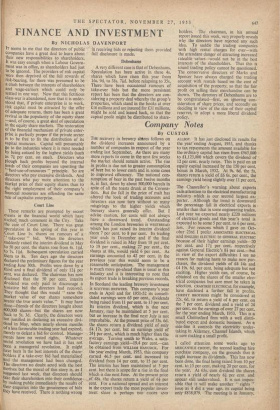FINANCE AND INVESTMENT
DAVENPORT By NICHOLAS IT seems to me that the directors of public companies have a great deal to learn about their new responsibilities to shareholders. It was easy enough when a Labour Govern- ment was in office, as shareholders had just to be ignored. The providers of risk capital were then deprived of the full rewards of risk-bearing, for there was presumed to be a clash between the interests of shareholders and wage-earners which could only be settled in one way. Now that this fictitious class-war is abandoned, now that it is under- stood that, if private enterprise is to work, risk capital must be attracted by the offer of adequate returns, there has been a great revival in the popularity of the equity share —and, of course, a great deal of speculation in the equity share markets. The restoration of the financial mechanism of private enter- prise is perfectly proper if the private sector is to be free to fix the distribution of its capital resources. Capital will presumably go to the industries where it is most needed by being enticed by the highest yields (such as 74 per cent. on steel). Directors who plough back profits beyond the internal needs of their companies are upsetting the best-use-of-resources " principle. So are directors who pay excessive dividends. And directors who pay more attention to the market price of their equity shares than to the right employment of their company's financial resources are offending the same rule of capitalist enterprise.
Court Line These remarks are prompted by recent events in the financial world which have excited much comment in the City. Take the case of Court Line. There was great speculation in the spring of this year in Court Line Is. shares on rumours of a " take-over " bid. When the directors suddenly raised the interim dividend in May to 50 per cent. the shares rose from 4s. 1 id. to 7s. 1 id. Subsequent speculation carried them to 8s. Ten days ago the directors declared the preliminary figures for the year ending June 30th. Profits were down by a third and a final dividend of only 121 per cent. was declared. The chairman has now disclosed that the 50 per cent, interim dividend was only paid to discourage a tentative bid the directors had received. They thought that this would " raise the market value of our shares somewhere nearer the true assets value." It may have done—friends of the directors bought about 400,000 shares—but the shares are now back to 5s. 3d. Clearly, the directors were not justified in declaring an excessive divi- dend in May, when nearly eleven months of a less favourable trading year had expired, merely to defeat a bid for control. Manage- ments have no vested rights. Whatever social revolution we have had it has not been a managerial revolution. It might have been in the best interests of the share- holders if a take-over bid had materialised and the management had been changed. The directors no doubt acted with the best Motives but the moral of this story is, as I suggested last week, that directors should take their shareholders into their confidence • by making public immediately the results of their enquiries into the genuineness of bids they have received. There is nothing wrong Speculation has been active in these 4s. The conservative directors of Marks and shares which have risen this year from Spencer have always charged the trading There have been occasional rumours of acquisition of the property, so that the fair take-over bids but the more persistent profit on selling their merchandise can be report has been that the directors are con- shown. The directors of Debenhams are to sidering a property deal whereby the group's be congratulated—first, on ignoring con- properties, which stand in the books at over sideration of share prices, and secondly on £16 millions and are insured for £31 millions, deciding in view of the size of their capital might be sold and leased back, so that the reserves, to adopt a more liberal dividend capital profit might be distributed to share- policy. in receiving bids or rejecting them provided full disclosure is made.
Debenhams holders. The chairman, in his annual report issued this week, very properly reveals why the directors have rejected any such idea. To saddle the trading companies with high rental charges for ever—with the attendant danger of attracting increased rateable values—would not be in the best interests of the shareholders. That this is
































 Previous page
Previous page